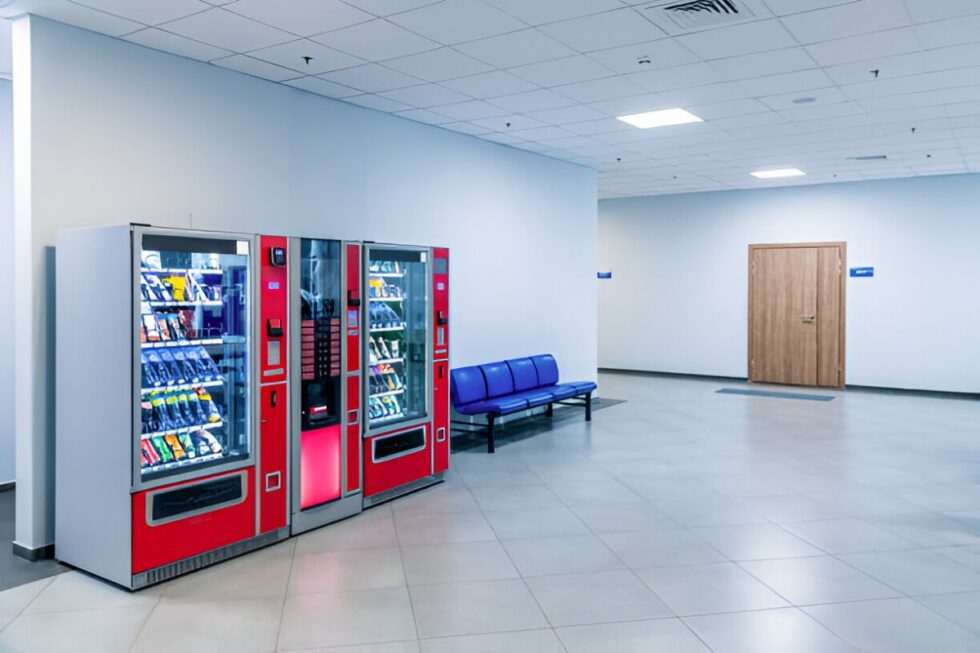
Vending machine business – Starting vending machine business! This can be a rewarding venture, offering a convenient service to customers and generating passive income.
What Is Vending Machine Business
The vending machine business is one of the best business opportunities for start-ups because of its low capital intensity, ease of entry, and expandability. Almost any food or non-food items can be stocked in vending machines; these machines can stock drinks, snack foods, menstrual products, clothing accessories, electronics and much more – making them suitable for many business ventures. To do this, the following subtopics will have been covered in this article: Steps involved in starting vending machine business, Pros and Cons, and strategic plans for vending machine business.
Why choose to start a Vending Machine Business?
- Low Start-Up Costs: One does not need a lot of capital to start because one can start by installing a few machines and add more later when the business is growing.
- Passive Income: When one places a product in a vending machine, he is assured of a cash flow without his intervention after fixing it.
- Flexibility: It’s flexible because you can set your working hours and organize the business based on lifestyle.
- Scalability: With increased profit, you can also buy more machines to cover a wider market.
- Minimal Overhead: Other than the cost of acquiring the machine either through sale or hiring, you will require capital in terms of stock and for maintenance.
Starting a vending machine business; comprehensive information on how to get started
1. Research the Market
- It is very important that you fully understand why vending machines are needed in your location.
- Find out which sorts of goods are in demand.
- You should know more about the competition to know what they offer and how you are unique from them.
2. Choose Your Niche
Dependent on what type of products you are selling will determine your target market as well as your business strategy. Some common vending machine niches include:
- Snacks and Beverages: One of the oldest and perhaps the most used to this day.
- Healthy Options: This niche is highly profitable because the demand for healthy snacks has been rising.
- Specialty Products: Consider anything that has coffee, a hygiene item, or an electronics tag on it.
- Combination Machines: Products where two or more products are sold together for instance snack and beverage services providing machines.
3. Create a Business Plan
Having a business plan formulated clearly will help to advise the direction of the business, as well as aid in organization. Key elements to include are:
- Startup Costs: The cost of the machines to be used and acquiring the initial stocks and some operating costs.
- Revenue Projections: Predict how much you will be paid depending on the machine’s location and the products sold.
- Marketing Strategy: To what kind of employees markets and customers will you seek your machines?
- Maintenance Plan: Maintenance of these facilities and always making sure that there is adequate supply of the required items.
4. Buy Vending Machines or Rent or Lease Vending Machines
You can either buy or lease your machines:
- Buying: This kind of has more initial cost but you own the machine in every way possible.
- Leasing: Although in smaller proportions, a higher prospect of regularly spaced payments throughout the subsequent months. Types of vending machines include:
- Mechanical Machines: Standard, inexpensive vehicles omitting sophisticated technology-related specifications.
- Electronic Machines: So newer machines that can handle credit card, have touch screen and provide sales report etc are more sophisticated.
5. Find Prime Locations
Place is a vital element when it comes to vending machines or any kind of machines dealing with sales. Look for places with high foot traffic and demand, such as:
- Offices, business premises and shops
- Schools and universities
- Gyms and fitness centers
- Malls and shopping centers
- Hospitals and other healthcare related institutions
- Discuss and sign placement deals with property owners basing the agreement on commission or a fixed amount.
6. Stocking and Maintenance
It is very important to stock and maintain machines frequently in order to meet their expectations of the customers. Be certain to buy from suppliers who stock at cheaper rates in large quantities, this can help to optimise profitability. Maintenance involves washing machines, ordering new supplies, assessing faulty limbs and technology updates.
7. Legal Demand and Licensing
Remember to follow the legal requirement of your country of space and time selected for your business operations. Depending on your location, you may need:
- Business licenses
- Permits for each machine
- Insurance to cover the risks and some probable problems for example theft or any other accident occurrences.
8. Control Sales and Monitor Performance
Don’t think of the typical one as shown on the picture with a slot to put in coins; some of the vending machines that are being produced today and installed around are digital and come with all those additional functions such as Sales monitoring and stock checking. Minimum and maximum inventory should always be monitored for each machine and be determined by rotation, demand and frequency of use of each item.
Financial Considerations
1. Startup Costs
- Machine costs: The range of prices is quite large; simple machines may begin from $1000, and the complex ones can cost more than $5000.
- Product stock: To this end the initial stock investment shall be determined by the type of products to be sold. It is estimated that you require $200–$500 per machine to finance micro hydro power.
- Other expenses: Obtaining your delivery, setting up, permits, and initial marketing and advertising can also translate into more cash out of pocket.
2. Revenue Potential
The level of your earnings depends on location, and the type of product that one is able or willing to offer in the market. For instance, a machine in an office complex or a health club could earn $300- $400 monthly. It found that vending machines make an average of $35 to $300 in a week.
3. Recurring Expenses
- Replacing commodities and products to the stores from time to time.
- These could include costs of repairing or maintaining the machines used hire various processes of the business.
- Lease payments (if you decided to lease).
Tips for Success
- Research Locations Thoroughly: You have to identify possible hot spots where the product would be relevant and that has many clients passing by.
- Offer a Mix of Products: When stocking up on the goods to sell, ensure you have an assortment of goods that many customers need in addition to Course Hero coupon unique products.
- Focus on Customer Convenience: Choose machines that can accept cash too with an addition on cashless methods such as; credit card and mobile payments.
- Negotiate Well with Location Owners: By coming up with attractive market price to the property owners, you will be able to sign them into providing strategic locations for the machines.
- Adapt and Expand: When your machines are well established seek for new ways of growing by acquiring more machines or opening up new markets.
Conclusion
It is recommended that one may start a vending machine business as one of the simplest business opportunities with low levels of initial investment. However, the areas that comprise the main determinant of success include the selection of the appropriate products to place, selection of the right places to locate your machines, and proper maintenance of the machines. By expanding the right strategies and techniques of management, it will be possible to expand vending machines business and earn passive income over time depending on its growth




